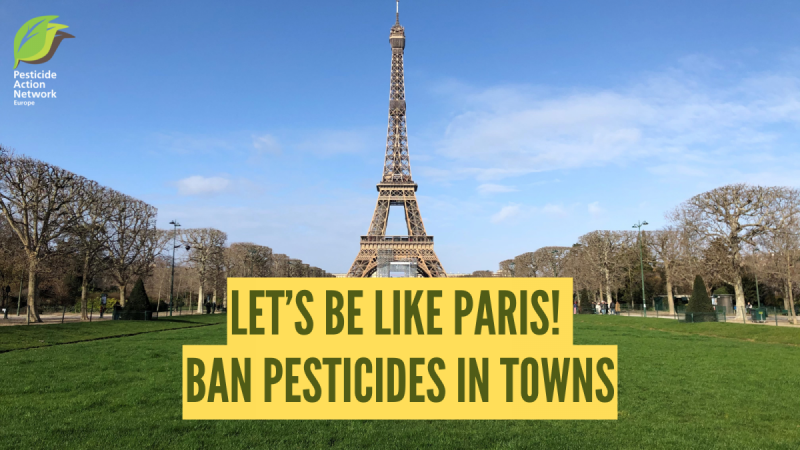During the Olympics, the world saw how the capital city of France still looked nice and clean. It was not overgrown by weeds in the 7 years the city has not used pesticides. The Pesticide Action Network UK, 150 councillors and 15,000 citizens call on the UK government for urban areas to be free of toxic chemicals. Some EU countries and many councils in other countries provide a good example.
Pavements, parks and playgrounds should be free of toxic chemicals in order to protect biodiversity and human health. Amy Heley from the Pesticide Collaboration said in The Guardian: “Most people don’t know that harmful chemicals are sprayed in the areas where they and their kids and pets live, work and play. Some claim that, without pesticides, UK towns and cities will be overrun by weeds in some Day of the Triffids-style urban takeover. But Paris has been pesticide-free for seven years [1], as have all the towns and cities in France, Denmark and Luxembourg. Watching the Olympics, and now the Paralympics, we have all seen how amazingly beautiful the streets and green spaces of Paris look … and the city hasn’t used a drop of pesticides to get there.” [1]
Paris started to reduce pesticides in the 1990s. Since 2017 pesticides have been banned in all French towns and cities, with a ban in private gardens in 2019. [2] So far there is no national pesticide ban for UK towns, but 100 councils have ended or significantly reduced the use of pesticides, and 50 are now pesticide-free. [3]
Heley added: “Our new government should commit to a phase-out of urban pesticides across the UK, including support for local councils to go pesticide-free. Ministers have promised to improve people’s health, clean up our rivers and restore nature. A ban on urban pesticide use would be a quick and relatively easy way of helping to achieve these aims. And it would be a massive win for the health of our kids, pets and wildlife. There are plenty of non-chemical alternatives to pesticides available. Paris and hundreds of other towns and cities across the world are proving every day that going pesticide-free is entirely possible. It’s a total no-brainer.”
Pesticide Free Towns in Europe
Acute exposure to pesticides can lead to headaches, eye irritation or even harm unborn children. Chronic exposure to pesticides can lead to severe diseases such as Parkinson's, cancers or lead to neurological disorders in children. Pesticides also kill beneficial insects such as bees, ladybugs, butterflies, but also frogs or birds. Since 2009, in order to reduce risks for citizens and biodiversity, EU Member States have the obligation to prevent exposure of citizens to synthetic pesticides. [4] In other words, the use of pesticides should be banned in towns, while citizens must be protected from pesticide use in agriculture. Belgium, Denmark, France, Luxembourg, Sweden, and the Netherlands have thus implemented laws that prohibit the use of pesticides by communes. In Germany, there are 600 towns on their way to becoming pesticide-free. [5]
According to our member Global 2000, many of the Austrian cities, towns and municipalities are partially pesticide free. The use of pesticides is usually limited to special areas such as cemeteries, sports fields, public swimming pools, historical gardens or private gardens. Pesticide-free weed control, which was apparently the biggest challenge in the past, is already standard practice in most places in Austria.
Still, 21 Member States fail to implement the EU directive from 2009 and establish a full ban on pesticide use in towns. PAN Europe therefore coordinates the Pesticide Free Town campaign [6], stimulating that cities become pesticide-free like Florence (Italy), Lisbon (Portugal), Tallinn (Estonia) and Zagreb (Croatia) with the most recent addition the Hungarian town of Törökbálint. [6]
Notes:
[1] Let’s be like Paris and ban pesticides in cities, say UK campaigners, The Guardian 28 Aug 2024
[2] Labbé Law, French regulation 2014-110
[3] Map of pesticide free towns in the UK
[4] Sustainable Use of Pesticides Directive 128/2009
[5] Pesticide Free Towns in Germany
[6] Campaign for Pesticide Free Towns in other EU countries
[7] Hungarian city of Törökbálint joins the European Pesticide Free Towns Network
